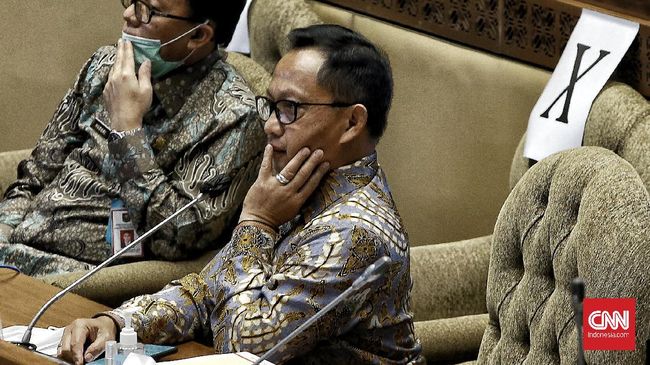Jakarta, CNN Indonesia —
Deputy Chairman of Commission II of the DPR RI, Luqman Hakim, highlighted the government’s proposal asking for a vote election 2024 postponed to April or May. He considered that the postponement of the voting to April or May would be too close to the implementation of the regional elections which were planned to be held in November 2024.
He conveyed this when Commission II held a Working Meeting with the Minister of Home Affairs Tito Karnavian, the General Election Commission (KPU), the Election Supervisory Body (Bawaslu), and the Election Organizing Honorary Council (DKPP) at the Parliament Complex, Jakarta, Thursday (16/9).
“The implementation of the 2024 election must be considered properly so that there is a time lag between the determination of the final election results and the election or regional election stage,” said Luqman.
According to the PKB politician, rationally, August must enter the registration stage for regional head candidates. Meanwhile, only three months are left to prepare for the 2024 regional election vote.
According to him, the short time will force instant decisions, both from the KPU and political parties in the face of the 2024 regional election.
“Short time will definitely force decisions that are instant. When the party determines the candidate for regional head, it is instant, transactional as the Minister of Home Affairs said, the cost is high, the output tends to be corrupt, of course we don’t want this to happen,” said Luqman.
“Therefore, give the public a chance, enough political parties to process candidates for regional heads. If May to August is very tight, later if the results are bad, another political party will get the sap,” he added.
Meanwhile, another Deputy Chairman of Commission II, Saan Mustopa, assessed that the government’s proposal to hold a vote in May 2024 was correct. He stated that if the vote was held in February 2024, the transition to the transition of government would be very long.
According to him, the long transition period will disrupt the effectiveness of President Joko Widodo’s government.
“We must also pay attention to the effectiveness of the government. This is so important,” said Saan.
He gave an example of how the transition period in the implementation of the Pilkada. The NasDem Party politician stated that in several cases, incumbent regional heads whose terms of office are about to expire could have their performance disrupted, if there is already a winner of the regional election.
“We have experience, for example in the pilkada, there are incumbents whose term of office will expire in a few months, but there are already elected regional heads, the results of the elections. Even though the change in transition still takes time, some even take a year and so on. Automatically, the course of government has been disrupted “Saan said.
“The winning Timses must have started to spread everywhere and put pressure on them. So the remaining regional heads are being pressured by the election winners. We shouldn’t let this transition take too long,” he added.
With an example like this, he assesses if the same thing could happen to the government of President Joko Widodo. Especially if the winner of the election is not from the incumbent.
“If the transition period is too long, the rest of President Jokowi’s government will definitely be disrupted. Especially if the incumbent loses to a challenger, it will be even more complicated,” he said.
However, according to Saan, this certainly needs to be explored further. He believes that the government and the KPU can find common ground regarding the implementation of voting in the 2024 election.
The Minister of Home Affairs (Mendagri) Tito Karnavian previously submitted the government’s proposal for the election to be postponed to April or May 2024.
This proposal differs from the Joint Working Team which agreed that the legislative election (pileg) and presidential election (pilpres) will be held on February 21, 2024. Meanwhile, the Regional Head Election (Pilkada) will be held on November 27, 2024.
(dmi / DAL)
– .

